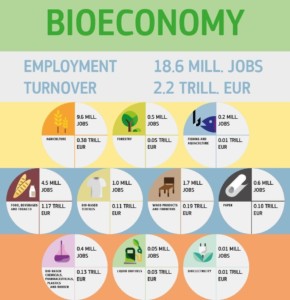The EU bioeconomy makes up an important part of the total economy in the EU. In 2014, it employed around 18.6 million people and generated approximately EUR 2.2 trillion. This means that the bioeconomy represents around 9% of all sectors of the economy with regards to employment as well as to turnover. These are the results of the European Commission’s 2016 report on the bioeconomy in Europe, which was released earlier this month.
The report shows that bio-based building blocks and polymers produce lower environmental impacts in comparison to their fossil references for the impact categories of climate change and non-renewable energy consumption. Yet, “the main hurdle for the production of bio-based products is to guarantee a stable supply of sufficient amounts of feedstock”, says the report. From the sectors using biomass, only the bioenergy sector is regulated by EU legislation promoting the use of biomass, which in turn influences the availability and the price of biomass for other sectors, such as food and bio-based chemicals and materials.
To overcome this obstacle, a level playing field is necessary that allows for equal access to and quality of biomass across all sectors of the bioeconomy. At the same time, the plastics and chemicals industry is investing in several research projects focused on the use of alternative resources streams like municipal, forestry, agricultural wastes, recycled feedstock, algae or energy-related crops.
While there is no specific bioeconomy legislation, funding for bioeconomy research and innovation is a key policy tool for promoting the bioeconomy. EU funding mechanisms include notably the HORIZON 2020 framework programme, the European Structural and Investment Funds (ESIF) and the European Fund for Strategic Investment (EFSI). Some 5.6% (EUR 4208 million) of the HORIZON 2020 budget is dedicated to the bioeconomy. HORIZON 2020 also provides approximately EUR 1 billion for the public-private partnership Bio-Based Industries Joint Undertaking (BBI JU), which are topped-up by private funds to an overall budget of EUR 3.7 billion.
Overall, the report shows that “the bioeconomy concept, thanks to its versatility, can provide opportunities for many Member States and their regions, independently of their very different natural resources endowment”. On the other hand, it stresses “the importance of cooperation within and between regions and Member States to exploit synergies to assure an adequate set of policies that promote the bio-based industry, secure access to competitively priced renewable raw materials, enable investments in research and development, innovation, demonstration and production facilities, focus on tackling hurdles to market creation and allow market pull measures”.
The full report can be found here.
